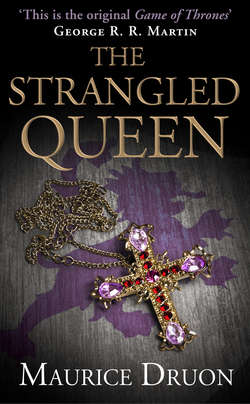Читать книгу The Strangled Queen - Морис Дрюон - Страница 8
Prologue
ОглавлениеON the 29th November 1314, two hours after vespers, twenty-four couriers, all dressed in black and wearing the emblems of France, passed out of the gate of the Château of Fontainebleu at full gallop and disappeared into the forest. The roads were covered with snow; the sky was more sombre than the earth; darkness had fallen, or rather it had remained constant since the evening before.
The twenty-four couriers would have no rest before morning, and would gallop onwards all next day, all the following days, some towards Flanders, some towards Angoumois and Guyenne, some towards Dole in the Comté, some towards Rennes and Nantes, some towards Toulouse, some towards Lyons, Aigues-Mortes and Marseilles, awakening bailiffs, provosts and seneschals, to announce in town and village throughout the kingdom that King Philip IV, called the Fair, was dead.
All along the roads the knell tolled out in dark steeples, a wave of sonorous, sinister sound spreading ever further till it reached all the frontiers of the kingdom.
After twenty-nine years of stern rule, the Iron King was dead of a cerebral haemorrhage at the age of forty-six. It had occurred during an eclipse of the sun, which had spread a deep shadow over the land of France.
Thus, for the third time, the curse laid eight months earlier by the Grand Master of the Templars from the middle of a flaming pyre was fulfilled.fn1
King Philip, stern, haughty, intelligent and secretive, had reigned with such competence and so dominated his period that, upon this evening, it seemed that the heart of the kingdom had ceased to beat.
But nations never die of the death of a man, however great he may have been; their birth and their death derive from other causes.
The name of Philip the Fair would glow down the centuries only by the flicker of the faggots he had lighted beneath his enemies and the glitter of the gold he had seized. It would quickly be forgotten that he had curbed the powerful, maintained peace in so far as it was possible, reformed the law, constructed fortresses that the land might be cultivated in their shelter, united provinces, convoked assemblies of the middle class so that it might speak its mind, and watched unremittingly over the independence of France.
Hardly had his hands grown cold, hardly had the great power of his will become extinguished, than private interest, disappointed ambition, and the thirst for honours and wealth began to proclaim their presence.
Two parties were in opposition, battling mercilessly for power: on the one hand, the clan of the reactionary Barons, at its head the Count of Valois, titular Emperor of Constantinople and brother of Philip the Fair; on the other, the clan of the high administration, at its head Enguerrand de Marigny, first Minister and Coadjutor of the dead king.
A strong king had been required to avoid or hold in balance the conflict which had been incubating for many months. And now the twenty-five-year-old prince, Monseigneur Louis, already King of Navarre, who was succeeding to the throne, seemed ill-endowed for sovereignty; his reputation was that, merely, of a cuckolded husband and whatever could be learned from his melancholy nickname of The Hutin, The Headstrong.
His wife, Marguerite of Burgundy, the eldest of the Princesses of the Tower of Nesle, had been imprisoned for adultery, and her life was, curiously enough, to be a stake in the interplay of the rival factions.
But the cost of faction, as always, was to be the misery of the poor, of those who lacked even the dreams of ambition. Moreover, the winter of 1314–15 was one of famine.
